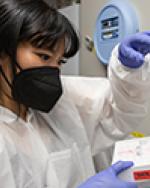
To those thinking about research, I would tell them to not be afraid and to just go for any opportunity they are considering because it will surprise them how natural and welcoming research can be. It is not a competition, but rather a supportive and patient community ready to welcome any contributions from passionate minds.
Please give a brief, simplified overview of your research project.
Texan grapes can grow in the harsh heat and sunlight as well as heavy rainfall, hail, and even early frosts. This causes an increased vulnerability to fungal and viral diseases and excess DNA damage and oxidative stress. UT Wine Initiative (UTWI) focuses on how Texas grapes used for viticulture adapted biochemically to withstand the less-than-ideal climate by researching how heat shock proteins specifically prevent DNA damage. Commercially, advantageous findings will help the Texan wine industry prosper if native wines are found to have higher antioxidant levels that can emphasize health benefits. Biologically and medically, research on this topic may potentially allow scientists to apply the grapes’ defense strategies against DNA damage to other organisms as well.
Describe the tasks you engage in as part of your work.
UTWI’s research tasks include examining the protein level, a mechanism for expression, post-translational modification, DNA repair proteins, and antioxidant defense system of HSP26, HSP22, HSP21, HSP70-11, HSP70-5, and HSP90-1. Procedural tasks include basic lab tasks such as western blot and agarose gel electrophoresis.
Describe what you thought college might be like before you came to UT. Did you consider research when thinking about college?
Before coming to UT, I thought college would be another obstacle before I could go into medical school and was not even aware that research could be a career option for me, much less an undergraduate experience. However, I was surprised to learn that there are biomedicine graduate programs I can look into that better suit my preferences of lab work, health science, and academia.
How did you get involved with your research project?
I got involved with research by accident. I was sent an invitation to join Freshman Research Initiative, which I accepted on a whim. I chose BioBricks as my research stream and spent a little over one semester learning foundational lab techniques, then began working on the new UTWI project within the stream. Over the summer I drafted a research proposal for the UTWI that I plan to present at the spring Undergraduate Research Fellowship.
Do you see your project connecting with your plans for your future?
I think that my current project connects to my future because it has inspired me to look into a professional graduate school, instead of medical school. I think this project is a good nudge in the right direction for what type of research I am interested in pursuing in the future after graduation, such as biochemistry research related to health sciences. If not graduate school, I might consider medical school.
What is the most interesting or surprising thing you’ve gotten to do for this project?
The most interesting thing so far in this project participating in the hypothesis forming of the project. My research educator invited me and my fellow peers to contribute ideas into the specific biochemical pathway of Texan heat shock proteins. I was allowed to have my ideas heard and given the task of researching an assigned HSP that I formed a research proposal over.

